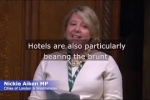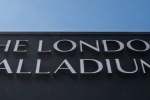Covid has put our theatres and cultural venues in a perilous position. As things stand, 70 per cent of theatres and cultural venues will run out of cash by the end of the year. If these theatres and venues do not survive, the entire West End ecosystem is at risk of collapse. Theatres bring in visitors who stay in hotels, visit bars, eat at restaurants and go shopping.
I am delighted to be joined by the Royal Opera House, Royal Albert Hall, Society of London Theatre, UKHospitality, and Heart of London Business Alliance in drawing up the West End recovery plan.
Watch the video and read our West End Recovery Plan below.
The West End Recovery Plan
A recovery plan for the West End ecosystem – our theatres and cultural venues, and the hotels, bars and restaurants that rely on them.
Currently theatres are closed with no realistic prospect of re-opening anything like a full schedule to full houses any time soon. They have no income from ticketing, drinks sales or catering. This is majorly impacting theatres as well as the rest of the West End economy. Our theatres have a significant multiplier effect – it is estimated that people spend 5-6 times their ticket price in the local economy – in restaurants, pubs, bars, hotels and shops.
The Society of London Theatre (SOLT) represents more than 50 major theatres with more than 15 million attendees every year. Roughly this is split in thirds - international visitors, Londoners and people from the rest of the UK. Even if venues could open tomorrow, international tourism is estimated to be non-existent for at least the rest of the year.
Part 1: The challenges facing West End theatres and the wider ecosystem
Social distancing
Social distancing is one of the big obstacles facing our industry. Keeping social distancing at 2m or even at the World Health Organisation (WHO) guideline of 1.5m would leave every auditorium unable to open economically. It would take capacity down to 15 – 25 per cent. Under these restrictions, there is a risk that venues and productions will never reopen.
Both the world-renowned Royal Albert Hall and Royal Opera House are in a perilous situation.
The Royal Albert Hall is a charity without government funding, relying 100 per cent on people coming in and buying tickets. With current social distancing measures, it would only be able to open to 35 per cent capacity, which is not viable. In this current scenario, the Royal Albert Hall will survive until April next year before being forced to fold. Meanwhile the Royal Opera House says its reserves won’t last beyond the Autumn in the current situation. Typically it brings more than 100 people on stage performing to an audience of 2,000 people. It needs 95 per cent occupancy just to break even.
If these theatres and venues do not survive, the entire West End ecosystem is at risk of collapse. They bring in visitors who stay in hotels, visit bars, eat at restaurants and go shopping.
Looking at the whole ecosystem
The Heart of London Business Alliance is formed of 600 businesses in the West End, representing a 46,000 workforce, and tens of thousands of workers through their supply chains across the UK. They are critical to the economy.
The entire environment is built around cultural attractions such as the National Portrait Gallery, English National Opera and the cinemas of Leicester Square and Piccadilly Circus. If these venues cannot draw people in, there will be no point for many hospitality businesses to reopen.
According to UKHospitality, our pubs, bars, hotels and restaurants have a matter of weeks before they run out of cash – and most have no reserves.
Part 2: The solution
Flexible social distancing and guidelines
Crucial to reopening, we need flexible social distancing and guidelines. Our venues, seated auditoriums, bars and restaurants need to fit people in to their spaces – just to break even. Reducing the social distancing guidelines to 1.5m would not make much of a difference.
Our first priority must be to keep our staff, artists and audiences safe. We need to consider other ways to keep people safe apart from distancing - such as strict cleaning regimes, sanitising and heat testing upon entry.
We need to urgently look at models from overseas (such as South Korea, Australia and cities such as Las Vegas) to come up with practical solutions and safety measures that will allow people inside our venues. In South Korea they are safely showing Phantom of the Opera to an audience of 1,200 people through a whole range of measures for people as they enter the theatre.
We must ensure social distancing does not become permanent or the ‘new norm’ in which we cannot go out to enjoy a drink, a meal or the theatre. We must use it as a temporary measure while we get in place additional infection measures -to help get normal life back.
Put the culture, arts, leisure and hospitality sectors at least on par with manufacturing
We’ve seen that a thriving cultural and arts sector is vital for the West End ecosystem of pubs, bars, hotels and restaurants.
The hospitality industry alone in the UK is a phenomenal export earner, generating £40bn in tax for the exchequer each year. We need the government to recognise the huge contribution of these sectors and put them at least on par with car and steel manufacturing plants.
Furthermore, these are UK-wide industries which the government need to prioritise.
Government investment through arts bonds
The theatre industry is talking to government about a securing an urgent injection of money to keep it going. We need a serious and temporary financial intervention from the government that helps the whole ecology of theatre and performing arts. An investment rather than a bailout. This industry is critical for the economic and social recovery of the West End and the entire country – the returns on a modest amount of investment would be phenomenal.
The Royal Albert Hall, Shakespeare’s Globe, The Old Vic, and many hundreds of organisations up and down the country are independent charities and trusts with no government subsidy. Places like the Royal Opera House and the National Theatre receive some limited government investment and raise the bulk of their income through trading through ticket sales, drinks and catering alongside philanthropic donations and sponsorships in support of productions and learning programmes. Many of the commercial operators are young and don’t have substantial resources to fall back on.
We need an investment that helps all three pillars keep alive while they recover. A figure of around £300m, per three months that venues are closed, will save the sector across the whole of the UK. A modest amount compared to the hundreds of millions being considered just for single companies.
The government should invest in the long term health of both venues and productions through an open and innovative participation scheme. One way is through purchasing arts bonds. Once organisations are back up and running independently, they pay the government back with a share of profits or in kind through outreach, community engagement and learning programmes. This modest, short term investment would prevent redundancies, enable theatres to do socially distanced productions over the coming months, and in turn help the ecology of businesses including pubs, bars hotels and restaurants. It would help regenerate the West End as well as other towns and cities in the UK.
An aspirational timetable to save pantomime
We need a timetable from government to bring big events back. We know it will be conditional and a moveable feast, but it will allow businesses to plan and forecast.
The period of Halloween to New Year (Quarter 4) is vital for theatres. Christmas may seem far away, but for regional theatres especially, profits from Christmas pantomime keep them going for the rest of the year. Outside central London, pantomime is the bedrock of regional theatres which in turn help their local pubs, bars, hotels and restaurants.
We need government guidance by the beginning of July. An aspirational timetable will help our theatres, hotels and restaurants confidently plan ahead for one of the busiest times of the year.
The consequences if we don’t act
A recent survey from the Society of London Theatre says, as things stand, 70 per cent of theatres and cultural venues will run out of cash by the end of the year.
UKHospitality says that in the next 2 weeks, a third of our hospitality venues and 1 million jobs will go unless we get serious help.
Our theatres, cultural and entertainment venues are at the heart of our economy in the West End. If they don’t open soon, our ecosystem is at serious risk of collapse. Businesses such as pubs, bars and restaurants will close.
We are world-renowned for our arts, theatre and culture – and they will be vital in helping us feel better as we recover from this difficult time.
For the sake of our economy, our society, our health, and our international standing, we must save these industries.
The Recovery Plan:
-
We need to keep social distancing flexible and temporary, and look at overseas models such as South Korea, Australia and Las Vegas to see how we can bring mass people into buildings safely.
-
Let’s put our culture, arts, leisure and hospitality sectors at least on par with car and steel manufacturing in the UK. The hospitality industry in the UK alone generates £40bn in tax for the exchequer and we export phenomenal amounts. We need the government to recognise the huge contribution of this sector.
-
We need a temporary and modest government investment into the sector to the tune of £300m for every three months venues remain closed. The government should invest in the long term health of both venues and productions through an open and innovative participation scheme. One way is through purchasing arts bonds, with returns once venues are back up and running.
-
We need an aspirational timetable to being big events back so theatres, hotels and restaurants can plan and forecast for Christmas – one of the busiest times of the year.











